A Personal Milestone; Two Cars That Demonstrate the Choices
This month I’ve tested two very similar cars back-to-back, I think bringing into sharp relief where we (California and the U.S.) stand when it comes to the transition to electric vehicles. We are at an EV crossroads, where there are real choices available on the EV side that will work for most consumers, while the traditional offerings continue to improve. It’s not a no brainer decision because there’s something to be said for both choices.
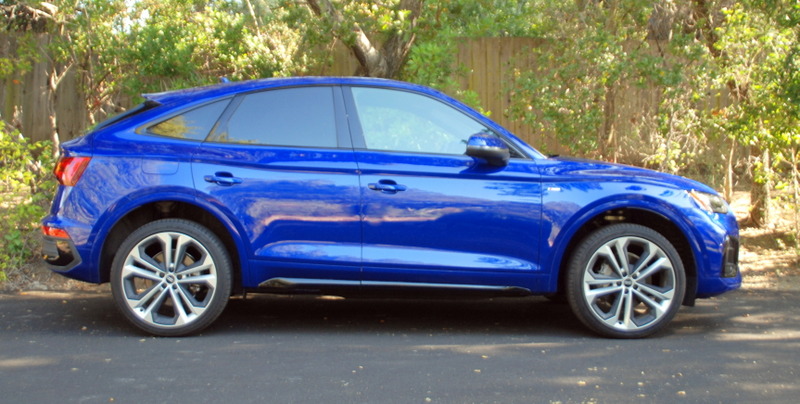
But a little context. This story is the 2,000th one posted on Clean Fleet Report (as a point of reference we hit story #1,000 on Feb. 1, 2018). When this publication began in 2006 commercially available electric vehicles were a novelty; the idea of a mainstream EV was part of a vision of a sustainable transportation system of the future. In a few short years the launch of the Nissan Leaf and Chevrolet Volt moved us closer to that vision becoming reality. The Tesla Model S’ introduction in 2016 marked another milestone, but the Model 3 in 2019 and Model Y in 2020 broke the EV market wide open. Then the market begins to explode with dozens of models over the next couple years from major automakers and start-ups.
Here we are today, at that crossroads of “old” internal combustion engine technology and insurgent electric propulsion. The past two weeks I had a dramatic experience with two cars that illustrate where we are in this crossroads. Two paths are before us. They’re not equal, but they are different.
The Two Paths
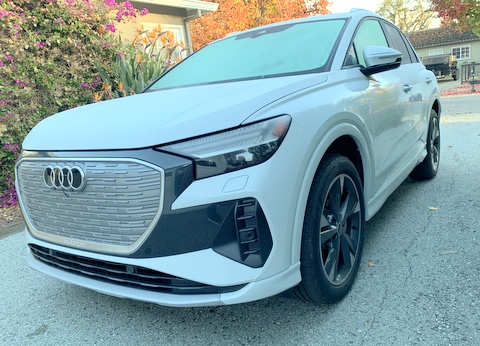
It’s unusual to find two relatively equivalent vehicles offering a choice of gas or electric fuel. You could argue a plug-in hybrid (PHEV) does that, but that’s not really true. A PHEV is a dual-drive vehicle, but is either a gas-powered car carrying around an electric motor and load of batteries to assist it or an EV lugging a heavy gas engine in case it runs out of battery.
I was tipped off to a great physical comparison tool that drove home how similar in size these two vehicles were. Reilly Brennan of Trucks Venture Capital does a great job of providing a weekly summary of action in the advanced automotive technology world. (Sign up here.) He mentioned Carsized as a way to compare the size of two vehicles.
It overlaid the Q5 Sportback and Q4 E-tron (non-Sportback) and confirmed the seat-of-the-pants feel that in spite of being developed with different architectures, the visible differences are a matter of inches. The Q5 is four inches longer, a little more than an inch wider and sits on a six-inch longer wheelbase. Heights and ground clearance are nearly identical. The Q4 had the advantage in cargo space, offering up to 3% more, possibly because we’re comparing a Sportback configuration with a conventionally shaped SUV. The Q4 was also about 300 pounds heavier, the penalty for carrying an 82 kilowatt-hour battery pack under the floor.
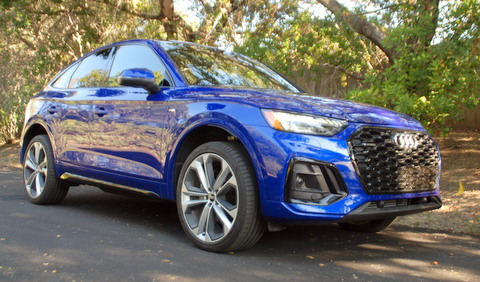
One key element that I couldn’t control but which turned out to be a pleasant surprise was the price. As equipped (and neither were base models) these $60,000+ SUVs were with $2,000 of each other, which in the price range is a rounding error. As far as I was concerned, they were at price parity.
My situation was a real choice. One week I was in an Audi Q5 Quattro with an efficient turbocharged 2.0-liter gas engine (28 mpg highway) for a run in the snow up to Lake Tahoe. I followed that with a week in an Audi Q4 E-tron EV driving several hundred miles around town. As similar as the two Audis were, the differences really stood out to me. Here’s a run-down of how the two squared off.
Power/Powertrain
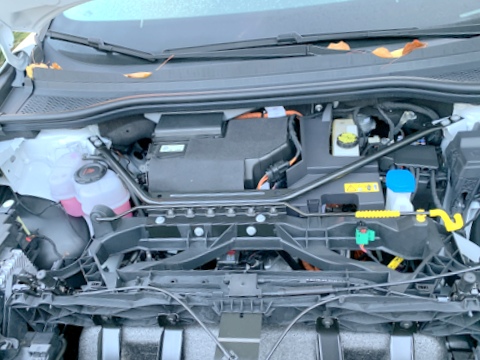
Audi has a reputation when it comes to engines. As a premium car, its goal is to always deliver easily accessible power whenever the driver demands it. Mission accomplished with both of these models, though in very different styles. The turbocharged four in the Q5 spun up smoothly but betrayed the its small size even though it claimed 261 horsepower (hp) and 273 pound-feet of torque (lb.-ft.). The E-tron flashed the power of an EV with 295 hp and 339 lb.-ft. of torque delivered off the line. Even with the extra weight, electric power felt so much quicker it was one of the distinct differences in the two cars though neither ever felt inadequate. The Q5 handled the 7,000-foot ascent to Tahoe with aplomb and the Q4 navigated the local mountain roads like it was right at home.
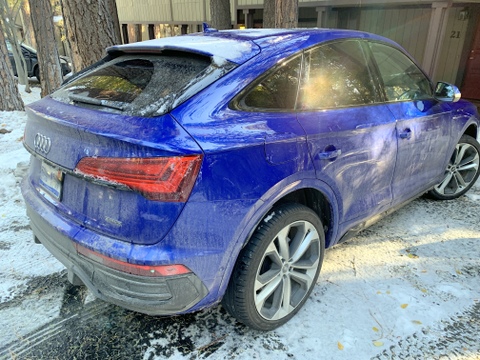
Ride/Handling
One word covers this area—Quattro. It’s attached to all of the Audi SUV/crossovers and many of the cars and brings a heritage from motorsports and decades of engineering development. The Q5’s Quattro all-wheel drive system got a workout in the slippery conditions of a fresh snowfall, but performed flawlessly. As mentioned above, The Q4 used its battery-created low center of gravity, sophisticated suspension and all-wheel drive to perform more like a sports car than a compact SUV on the challenging mountain roads of my test route. Both models were winners because of Audi’s technology here.
Interior
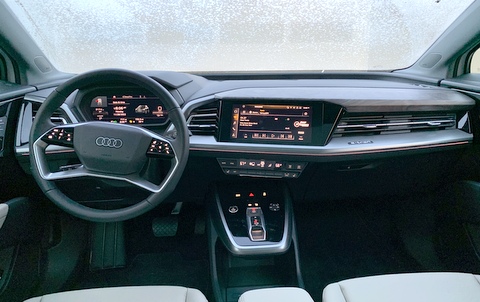
This is a luxury car. Not a high-end, spare no expense luxury car, but a premium car that uses higher end materials and exhibits more craftsmanship in their execution. But it is still a mass-produced automobile. If we parse things between the two, we got sportier seats in the Q5 with better lateral support. The Q4 actually outperformed the seat’s ability to keep me in place. Around town or on the highway, there were no problems, just the kind of comfort you’d expect from an SUV in this price category. Controls in the two cars were nearly identical. Both featured a head-up display, a feature we found critical in night driving in the snow and prefer at all times. What was curious in these two nearly identical models is that the Q4, maybe because it was a newer design, felt more upscale. The E-tron also felt more spacious because the EV platform allows for more usable interior space.
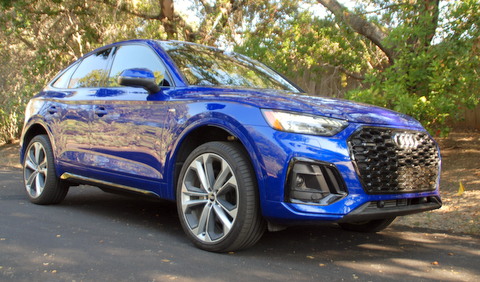
Looks
The Q5 was a Sportback model, a design tweak that attempts to give a more coupe-like illusion to a crossover by tapering the roofline to the rear. Our Q4 was the standard upright SUV-like profile. The Q5 definitely has the looks and its wider stance and standard grille makes for a slicker look. The Q4 is more upright and its closed “grille” of silver plastic could use some work to make it fit the premium image of Audi.
Utility
We just noted the declining roofline of the Sportback. That decreases the cargo volume in the rear of the Q5, but the impact is not that great 18 cubic feet compared to 24.8 cu. ft. in the Q4 behind the second row of seats. The E-tron has some tradeoffs. The batteries underfloor placement doesn’t intrude into the cargo area, but it does play a role in raising the lift-over height for the rear. It’s an SUV thing—if you want the higher ride height, it’s going to affect ingress/egress and lift-over heights in the rear. With the rear seats down the cargo space in the two models narrows, with the Q4 having less than a cubic foot more space.
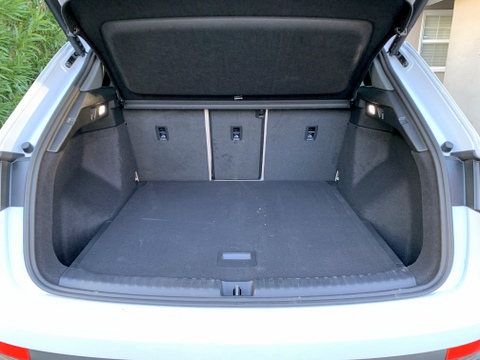
Another big element in utility is that 800-pound gorilla encountered at the charge port of every EV. We chose the Q5 for our Tahoe trip not because it was a more capable machine in the late fall snow, but because we didn’t feel like engaging in a “find the charger” routine for the 500-mile roundtrip. The choice was confirmed when in our first stop during our week in the Q4 at a DC fast-charger resulted in several minutes of fumbled attempts to connect that resulted in no charge. We had plenty of range to get back home in this run and probably could have sorted it with a little more patience and maybe some help from EVgo, but we know the experience is not unusual. Our second attempt was successful, but only after several minutes with 24/7 tech support and switching chargers.
The number of chargers is growing and the support for them is marching forward in parallel, but it’s still no “gas station” experience like we had with the Q5. Actually, a funny aside. The first gas station we stopped at to top off the Q5’s tank also had non-functioning pumps, but rather than spending any time there or calling tech support, we drove another block to the next station and easily filled up.
Environmental Impact
You might expect this would be a slam dunk for the Q4, but let’s zoom out for moment to look at a bigger picture. We had a Q5 45, the mid-level version of that model. The Q5 55 is a plug-in hybrid that packs more horsepower—362 total hp and 369 ft-.lb. of torque—than our trim level did and offers about 35 miles of pure EV driving, but with a gas-engine backup (a different spec of the same engine we had, delivering similar fuel economy) that would eliminate any charging frustration. That power would equal the EV’s.
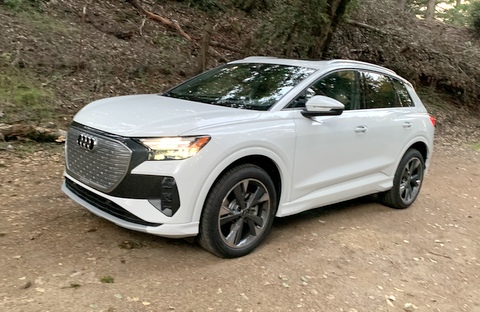
Of course, as they say, zero is zero. It’s hard to beat an easy-driving, luxurious SUV with a 240-mile range when it can be purchased at a price similar to its ICE counterpart (without even considering various incentives that might be available). As tempting as it is to opt for a Swiss Army Knife solution that solves all of our potential driving situations, we’d suggest going for the E-tron between these two choices and maybe renting an ICE model for longer trips.
It’s not a slam dunk given the current charging issues (although if you can do 240-volt home charging takes care of most of them), but the quantity and quality of EV choices is getting better every day. In this Audi EV crossroads, I think the company has made it relatively easy to join the EV parade.
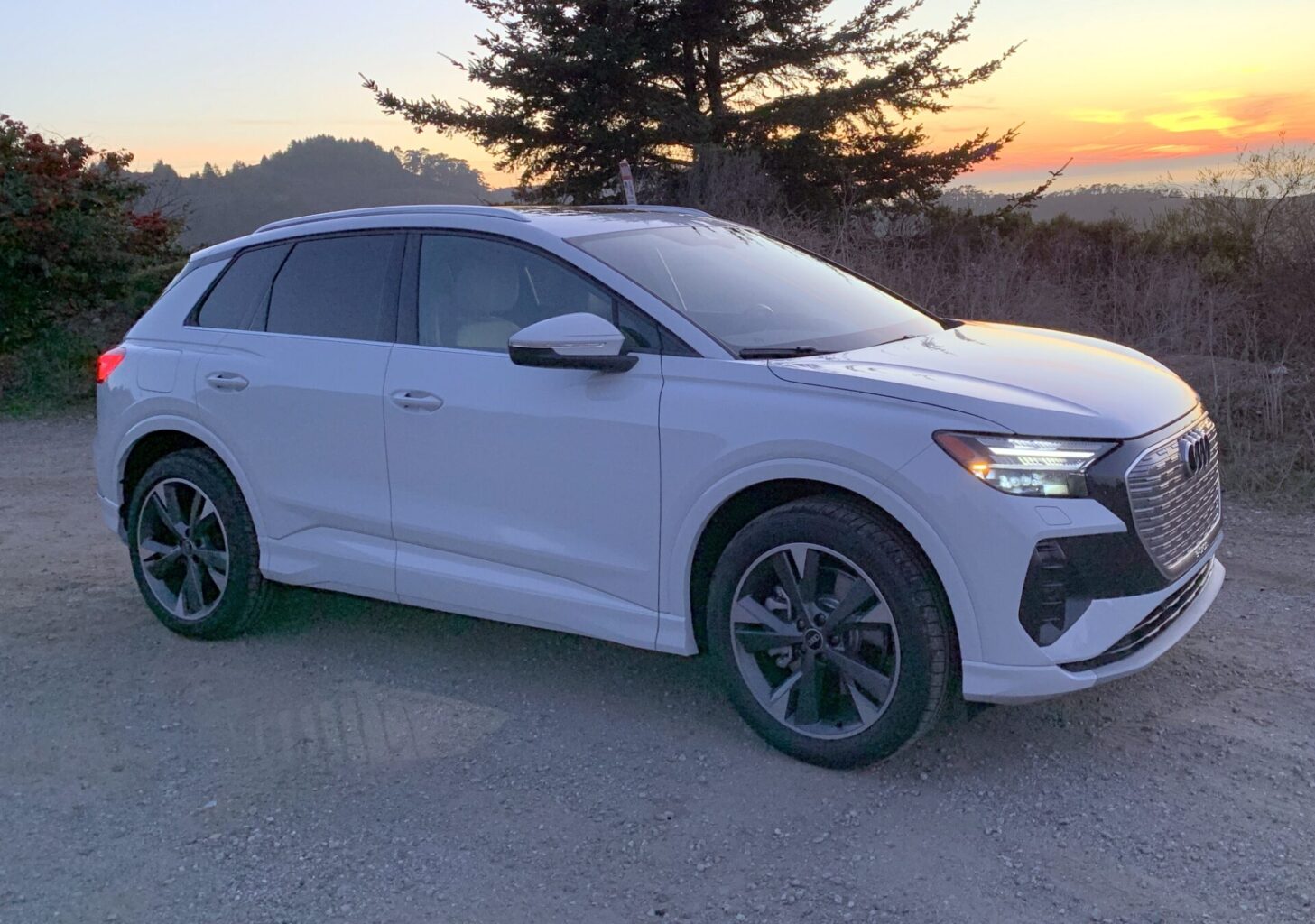
buy generic lasuna – himcolin price himcolin online order
order besivance without prescription – carbocysteine sale how to buy sildamax
cheap gabapentin online – order azulfidine 500mg online buy sulfasalazine 500mg
probalan where to buy – buy tegretol online carbamazepine ca
celecoxib uk – cheap flavoxate pill order generic indocin
buy diclofenac 100mg – order voltaren sale aspirin 75 mg sale
order rumalaya online cheap – endep 10mg sale elavil 50mg uk
order mestinon 60 mg sale – buy pyridostigmine 60mg generic imuran cost
purchase diclofenac online – buy generic imdur 40mg brand nimotop
order baclofen 10mg – purchase piroxicam order piroxicam 20 mg without prescription
meloxicam 15mg for sale – buy mobic 15mg online order toradol 10mg online
trihexyphenidyl cheap – artane tablets order voltaren gel
cost omnicef 300mg – generic clindamycin
accutane price – buy deltasone 5mg pills buy deltasone 5mg without prescription
deltasone 5mg tablet – buy prednisone generic permethrin creams
buy permethrin medication – acticin ca buy tretinoin generic
brand betamethasone – buy betamethasone without a prescription where can i buy benoquin
order flagyl without prescription – buy cenforce 100mg generic cenforce 100mg sale
buy augmentin medication – buy synthroid sale order levothyroxine pill
buy generic cleocin online – buy indocin 50mg without prescription generic indocin 75mg
cozaar 25mg cheap – keflex 250mg price cephalexin sale
purchase crotamiton generic – buy crotamiton paypal where to buy aczone without a prescription
provigil order online – buy melatonin 3 mg meloset 3mg cheap
bupropion order online – xenical online buy shuddha guggulu where to buy
order capecitabine 500 mg online cheap – cheap ponstel without prescription buy danazol pills
buy prometrium pill – where to buy fertomid without a prescription cheap clomiphene pills
aygestin 5 mg cheap – buy aygestin for sale order yasmin pills
estrace usa – estrace 1mg over the counter cost arimidex 1 mg
гѓ—гѓ¬гѓ‰гѓ‹гѓі жµ·е¤–йЂљиІ© – гѓ—гѓ¬гѓ‰гѓ‹гѓі е‰ЇдЅњз”Ё г‚ўг‚ュテイン通販
valif pills graceful – buy generic secnidazole for sale where can i buy sinemet
valif online pretty – order sustiva 20mg online order sinemet 10mg online
buy phenergan online – lincomycin 500 mg generic purchase lincocin for sale
ivermectin 12mg for people – ivermectin for sale carbamazepine oral
order prednisone 20mg sale – buy starlix 120 mg generic buy captopril 25mg without prescription
buy prednisone 10mg pills – deltasone 40mg ca capoten buy online
buy accutane pills – order linezolid 600mg pill zyvox 600mg usa
cheap amoxicillin generic – combivent 100 mcg oral buy combivent
order prednisolone for sale – prometrium buy online buy progesterone 100mg generic
gabapentin 800mg over the counter – order gabapentin 100mg itraconazole 100mg oral
furosemide 100mg ca – order generic betnovate3 purchase betamethasone cream
oral amoxiclav – buy cymbalta 20mg sale cymbalta 40mg canada
monodox online order – generic ventolin buy glucotrol online